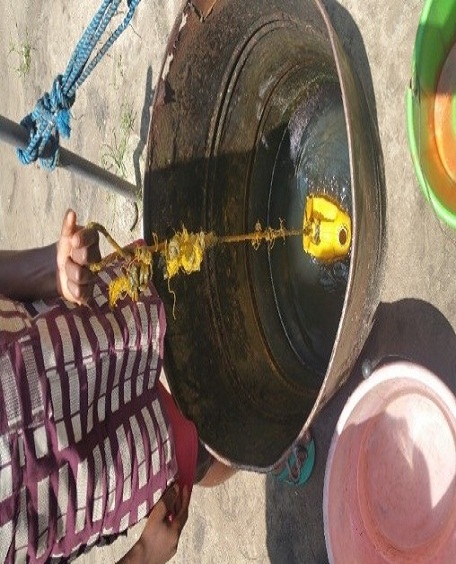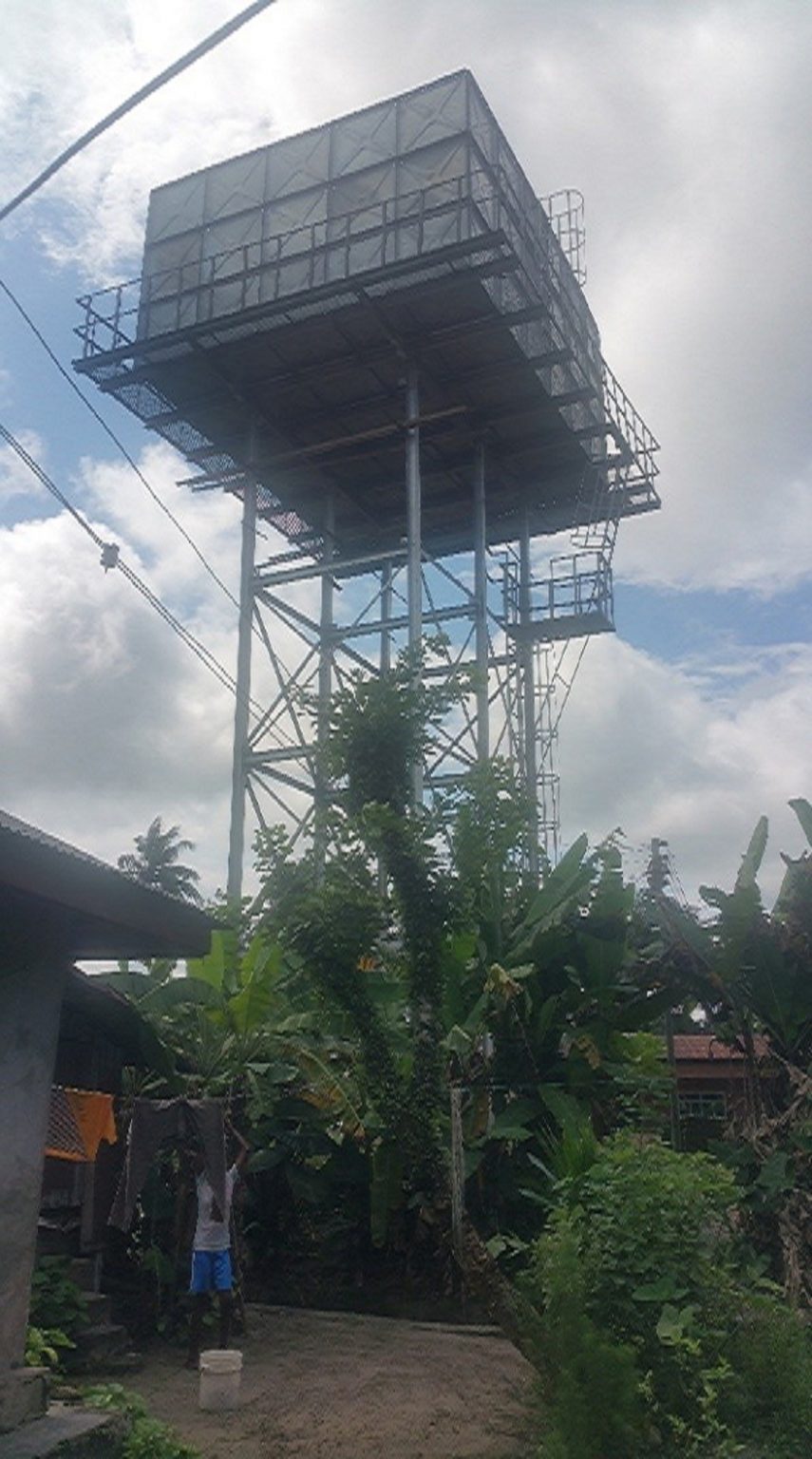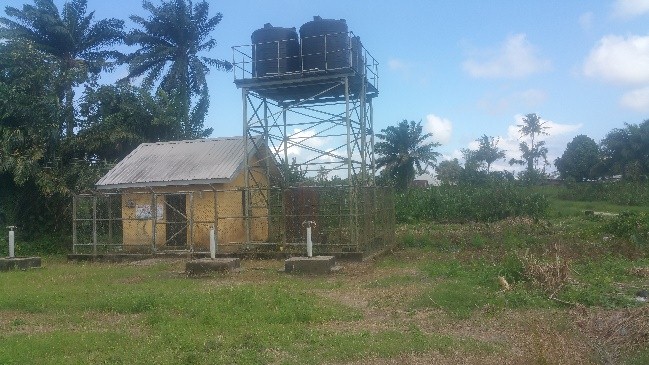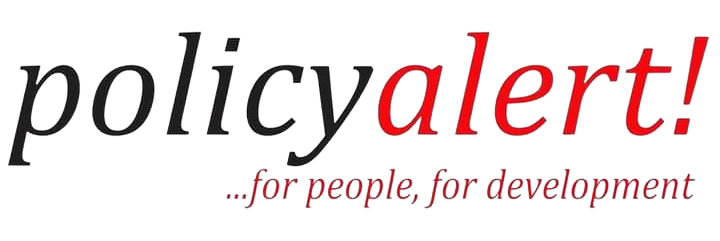Access to a healthy environment, including clean water and sanitation, is a basic right and is essential to allowing people to live healthy, decent, and dignified lives. Most people who live in coastal communities in sub-Saharan Africa suffer greatly from the inadequacy or complete absence of Water, Sanitation, and Hygiene (WASH) facilities in their communities.

Indigenes of Ukpenekang community in Nigeria’s oil-rich Akwa Ibom State, despite huge volumes of hydrocarbon resources extracted from their domain, have had limited access to potable pipe-borne drinking water. According to a number of persons interviewed during a visit to the community, people buy packaged water in sachets and bottles cargoed from the nearest city (Eket) for drinking purposes. Most people in the community source their water for cooking and washing from the open river or from shallow wells (see picture 1). The affluent ones—who are a tiny minority of the population – own private boreholes in their houses, but even this is poor comfort. Water from the shallow wells, boreholes and the river are all contaminated as a result of the activities of oil and gas companies operating in their backyard. This is worsened by the practice of open-defecation, owing to unavailable public toilets, which further pollutes water sources.
Regional interventionist agencies like the Niger Delta Development Commission (NDDC), who received a levy (3% of ExxonMobil’s annual budget) of $314.8 million (approximately N113.3 billion) between 2014 and 2016 from ExxonMobil, made an unsuccessful attempt to construct a functional water facility in Ukpenekang.

Picture 2: Abandoned NDDC water project in Ukpenekang
Over the years, the NDDC had created a reputation for itself of starting and abandoning projects across the Niger Delta, and it was no surprise that Ukpenekang’s water project was also left uncompleted. Millions of naira was wasted in constructing a big overhead tank (see picture 2) riddled with holes that has never warehoused water for one day.
Similarly, when I visited Ukpenekang in September 2019, another water project constructed by ExxonMobil was also not functional (see picture 3). An indigene of the community narrated that ExxonMobil built the water facility and transferred the responsibility for maintenance to the community.
The Akwa Ibom State government, the prime duty bearer in terms of quality service delivery to the people, has been found wanting in the delivery of critical social services to oil producing communities such as Ukpenekang.
Yearly, the entire budget allocated for WASH services for the entire state does not go anywhere close to what is required to care for the needs of people living in such resource-rich coastal communities. The entire WASH capital budget for the state for 2018 and 2019 was N600million and N500million respectively. However, nothing out of the designated sum was released to the agency (Akwa Ibom State Rural Water Supply and Sanitation Agency ) saddled with the responsibility of implementing WASH projects in the state.
It is no new knowledge that oil, gas and mining projects can incur significant social and environmental costs that are often borne disproportionately by people living close to where such extraction happens. Oil and gas activities particularly impede the health-related quality of life of people in the vicinity of extraction. Being the so-called “geese that lay the golden eggs,” one would expect that the government at all levels would prioritize the use of payments from hydrocarbon extracting companies to improve water, sanitation and hygiene facilities in resource-rich communities.
The problem is compounded by the fact that majority of the oil producing communities in the state do not have functional primary health care facilities, and when they fall sick which they often do because of poor hygiene, they have to travel far to access healthcare. As admitted by Shell Petroleum Development Company (SPDC), “In oil-rich Niger Delta, many people are too poor to make long journeys to health clinics.”
At a town hall meeting powered by Policy Alert in Ibeno on October 30, 2019, community members took turns to state the various health challenges that members of their communities were facing and the alarming rate at which such were occurring. These health challenges ranged from respiratory illnesses to fertility issues, birth deformities, high infant and child mortality, to more terminal issues like cancer. They also took time to talk about the sordid state and in some cases non-existence of primary health care facilities in their communities.

Granted, ExxonMobil, the main oil and gas company operating in the area, makes some contributions towards supporting social services in Nigeria as part of its corporate responsibility initiatives. As generous as these gestures may be, they remain voluntary in nature and whatever is available is spread too thin, with no special focus on the company’s operational location. As charity begins at home, one would expect that ExxonMobil would be making massive investments to support health and WASH services in Ibeno, as communities in this local government area host the company’s facilities and are more directly impacted by their activities.
It is worthy of note that ExxonMobil flared over 1 trillion standard cubic feet of gas in Nigeria between 2007 and 2018, with most of this flaring happening within or offshore Ibeno, where most of their Nigeria operations are located. That volume of gas flare would no doubt have a debilitating effect on the health of people living around the area. Poisonous gasses (e.g ozone, sulphide hydrogen, dioxide nitrogen, benzene, toluene, xylene etc) that are known to make up flare have been discovered to be responsible for ailments bothering on insomnia, cancer, asthma, bronchitis, and other respiratory illnesses. Therefore, it is not out of place for people impacted negatively by the activities of oil and gas companies to demand that those same companies establish functional healthcare facilities in communities that are directly affected by their operations.
